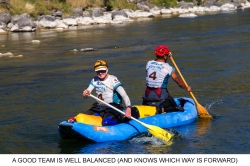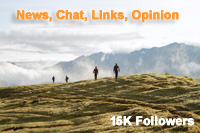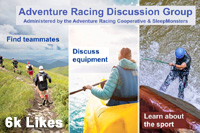Godzone Adventure Race
The GODZone Survival Guide - An Introduction to Expedition Racing
Warren Bates, Godzone Adventure / 09.09.2015


Were it possible to complete a university course in triathlon there is no doubt the successful graduate would emerge with a Bachelor of Science degree. What would the same student get if they studied a degree in expedition adventure racing? Yes, yes...some self-respect and a healthy loathing of one-piece lycra. Nope, the enlightened AR student would emerge, arms aloft, holding a scroll of paper with Bachelor of Arts stamped on it.
If you are going to waste your time reading this Introductory GODZone Survival Guide, which delves into some of the dark arts of expedition adventure racing, then let's make a few things clear from the outset. This is deliberately not a scientific piece of research. This is not a training guide (though we might post one of those soon if we can find one person who thinks it’s a good idea). Note: If you do want a training plan then there are literally thousands of people on the internet willing to charge you $50 a month for one (telling you stuff that you already know but choose to ignore for some unfathomable reason).
This is not a magical document that will transform your inept team into future GODZone winners by dint of the fact that you have several copies, printed and bound, taking pride of place in your lavatory. And unfortunately it isn’t going to win us a knighthood for services to coaching and sport. This is merely a short and vague ramble that aims to get you thinking about how to train and prepare for an event that is – understatement alert - pretty damn hard. Ultimately, it might provide you with an insight or two about how to survive and succeed at GODZone.
Let’s start with the basics. The stark reality is that nearly every successful team in adventure racing history has been made up of old people. Not free bus pass old, but certainly old compared to the champions of practically every other dynamic sport you can think of. Why? It is because the playing field that our sport is contested on is infinitely varied, even if the fundamental disciplines remain somewhat consistent. This variety, coupled with the teams of four, mixed-sex dynamic, means that preparation can’t be distilled down to just numbers and the appliance of science. You simply don’t know what you are going to come up against and how people are going to react until you are racing. Experience and adaptability are key, not just physical prowess (though you do need a hefty dose of that if you want to win). The best teams in adventure racing have learnt the ‘art’ of the sport, largely through experience, and have not spent their lives worrying about lactate thresholds and whether those stupid long socks really do increase blood flow to their extremities.
If you are a first timer at GODZone, if you consider yourself a novice, or are you are one of those teams that has previously been humbled by the event, then the most important thing is to learn from the teams at the front and how they practice the ‘art’ of racing. This doesn't mean learning to run, bike or kayak as fast as them (though this has considerable merits if you can pull it off and still go in the right direction (not as easy as it sounds)), it means you have to focus on getting as much experience as you can and use your preparation time wisely. Here are some of things that you might want to think about:
Navigation - We’ve said this before many times but navigation is crucial in expedition races and those who have competed previously at GODZone will be acutely aware that their event outcome will be dictated by how well they navigate and by the strategic decisions they make about route choice. You must learn the art of moving at a speed, which you can comfortably navigate at, rather than racing at a pace you can physically cope with, but which leads to mistakes. For some team members this may feel painfully slow at times but the alternative of being lost is not a good one.
Comparable skills - Leading teams rarely employ towlines or resort to pulling team mates relentlessly along for large sections of the event. Some tactical load shifting between backpacks is common but not much more. Why? It is because the variance in athletic and technical prowess between a leading team of four is usually a lot less extreme than that of a novice team of four. That annoying law of diminishing returns applies in elite levels of the sport and those at the very front of the field are often extremely well matched, rendering tows an emergency only option. What can we take from this? In summary, your best bet is to try and equalize your abilities. In athletic parlance, there is very little point having one person on the team capable of running a sub 30 minute 10k if the other three consider running that fast absurd, preferring to take a leisurely 90 minutes to do the same.
To expedite the development of your art try to create a team as evenly matched as possible, particularly on foot and on the bike (in the kayaks and canoes it can be well worth having a highly skilled person making decisions about the optimal lines down rapids, etc). Go out with your team and ascend some decent hills and run down some rough terrain. Walk up a gnarly riverbed for a few hours and teeter along a craggy ridgeline. Do some technical bike descents and climb some big hills. It should be blatantly obvious what your team’s relative weaknesses and strengths are. Then sit down and have an honest conversation about where improvements can realistically be made. You may be the God of biking on your local club rides but if your team mates are leaving you for dead on every descent then you need to work on keeping up. Similarly, if you are going up hills and wondering where the hell your team mates are (30 minutes down the hill, crying with the effort) then perhaps ease off the hill reps in training and focus on something more productive for the team – navigation/fast transitions/keeping the team well fed, etc. In short, a good team is a well-balanced team.
There is nothing wrong with a bit of selfishness - For some reason a narrative exists within AR that it’s all about super duper team dynamics and the best teams get on like a house on fire. Team Nike, probably the most successful team in AR history, didn’t give off the air of a team that loved to spend Christmas together, holding hands whilst they sang carols and toasted marshmallows.
Your first consideration on the course should always be to look after yourself properly. Do not neglect your own health, nutrition and over exert yourself just because someone has randomly nominated you as the team packhorse. If you have energy to spare and can see that others in the team are struggling then it makes sense to help. However, far too often we see some daft alpha male carrying the kitchen sink up the mountain on Stage 1, towing some poor female who keeps shouting - “I thought we’d agreed to take it easy on Day 1”? Three days later, that same daft alpha male is completely broken and the female is carrying his backpack, muttering under her breath “I told you we were going too fast on Day 1”. Always be aware of your team and how they are feeling, help where you can. But do not become a liability later in the race by failing to exercise sensible self-preservation.
Train as you expect to race – We’ve done a fair bit of analysis of the times it takes team to complete the stages at GODZone. The stats show us that the fastest teams will typically complete the early trekking stages at about 4km/h and the slow teams at about 2.3km/h. By the end of the event the leading teams will travel at about 3km/h and the slow teams will be moving at about 1.5km/h or less. As you can see, the average pace is not exactly electrifying. What you can deduce from this is that you will spend an awful lot of time going slowly. So why do people insist on doing a lot of run training, eh? It does give you a good work out in a short time but for GODZone a novice team will be far better served if ‘conditioned’ for the event rather than ‘fit’. Think hard about how to train and what will enable you to cope with the unique demands of going at what might be easily described as a snail’s pace for up to 7 days. We will provide some more training insights at a later juncture…just don’t expect the appliance of science – it makes our heads hurt.
Oi, stop mucking about – It has been mentioned before on the GODZone website that the novice or slow teams lose a lot of time versus the fastest by stopping a lot rather than just travelling slower. This is perhaps most apparent in transitions and the difference between good and bad is a sight to behold. At GODZone, Team Seagate will take approximately 25mins, on average, per transition. The team at the other end of the spectrum will take, on average, over 2.5hrs per transition. Let’s assume we have 10 transitions per race, that’s a combined time of 25hrs versus Seagate’s 4hrs 10mins. That’s an awful lot of time to give up when you consider that the slow team did pretty much the same as Seagate in the transition, except eat an extra tube of Barbecue flavoured Pringles.
Of course, it is important that you use transitions wisely, that you don’t forget equipment and that you eat whilst you can and it’s readily available. However, transitions are a deadly trap when it comes to mindless faffing. It is unrealistic for a novice team to transition like Seagate (they've done hundreds of them) but it would be wise to set yourself some goals – it’s the best way to make the team focus. Why not outline some realistic time targets? For example: All transitions on day 1 to be done in 45 minutes or less. All transitions on Day 2 to be done in an hour or less. Perhaps allow yourself a bit more time for a couple of key stages in the middle of the event and then tighten back up to 45 minutes for the last couple of TA’s as you sense the finish is in sight. Remember, it’s important that the entire team buys into the protocol for transitions, as one slow person will slow everyone up. There is nothing more annoying than racing through a transition with breathtaking efficiency, jumping on your bike in eager anticipation, only to be told that team mate X is having a shower (though we don’t often provide those options at GODZone, truth be known).
Get organised - Ideally as soon as possible and get used to using your kit on a regular basis. Day 1 of GODZone is not the place to discover that your flash new tights have a seam with a nasty tendency to sandpaper your delicates. Or that your head torch doesn’t provide enough light to read let alone ride a bike downhill at breakneck speed in the dark. It is always amazing how many questions we get about kit and logistics in the last couple of weeks before the event starts. We even had a team ask us if we knew where they could hire bikes a week before the start at one of the Chapters. Get your bike box built well in advance. Use it, abuse it, pack it, and unpack it. Take it away with you on your training trips and learn to love its frustratingly small capacity. And remember to take note of the allowed weights of your bike/gear boxes well in advance.
Finally and perhaps most importantly, remember that whilst GODZone is an incredibly tough event, it should be a fulfilling and rewarding experience too. Don’t beat yourself or team mates up about mistakes or worry about things that are outside of your control – the time for reflection is once the event has finished and your brain and body has returned to some kind of normality.
Enjoy your training, prepare well as a balanced team and remember, it’s more art than science. We look forward to seeing all the super slick transitions in beautiful Tasman next year.







 SleepMonsters
SleepMonsters



